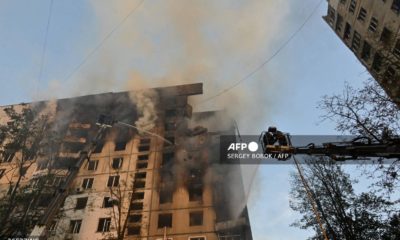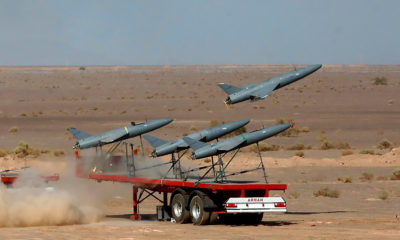NEWS
Russia claims responsibility for Ukrainian train station strike

Russia’s Defence Ministry has confirmed that its forces were behind Wednesday’s missile strike on a railway station in central Ukraine that Kiev said left at least 25 people dead, including civilians.
However, Russian Defence Ministry spokesperson, Igor Konashenkov, claimed that more than 200 Ukrainian soldiers on their way to fight in the Donbass region had been killed in the attack in the central Dnipropetrovsk region town of Chaplyne.
No evidence was produced to support the claim that so many soldiers died, however. Konashenkov added that the rocket hit a part of the station used by the Ukrainian military and that military equipment had also been destroyed.
The Ukrainian authorities said that 25 people, including two children, had died in the attack, while at least 30 others were injured.
The deputy head of the Ukrainian presidential office, Kyrylo Tymoshenko, said that both residential areas and railway infrastructure in Chaplyne had been targeted by Russian forces.
Tymoshenko said that an 11-year-old who was crushed under rubble and a 6-year-old killed in a car fire near the train station had been among the victims.
Neither the Russian nor the Ukrainian claims could be independently verified.
Ukrainian President Volodymyr Zelensky condemned the attack, which was carried out on Ukraine’s Independence Day, which fell six months to the day after the Russian invasion began.
US President Joe Biden called Zelensky on Thursday to offer him his moral support and to promise Washington’s continuing backing for Kiev as the war entered its seventh month.
Ukrainian train stations and rail infrastructure have repeatedly been targeted during the war.
In April, at least 57 people died in an attack on a train station in the city of Kramatorsk in the eastern Donbass region.
Another recurring feature has been Russian efforts to take control of Ukrainian nuclear plants, which has led to worries that a miscalculation could result in a nuclear catastrophe.
READ ALSO: Gunmen storm Anambra community, kidnap leader
Kiev said on Thursday that Ukraine’s Zaporizhzhya nuclear power plant, which is occupied by Russian forces, had been disconnected from the Ukrainian electricity grid, though Ukrainian nuclear agency Enerhoatom stressed that the plant’s power supply, which is vital for its safetly, was being maintained.
In his Thursday night video address, Zelensky called on the International Atomic Energy Agency (IAEA) to act with greater urgency over the contested plant:
“Every minute that the Russian military remains at the nuclear power plant means the risk of a global radiation disaster,” he stressed.
Moscow said that the last two last operational reactors at the plant had been forced to temporarily shut down due to Ukrainian shelling, though the Russian-installed governor of the Zaporizhzhya region, Yevgeny Balitsky, said on Telegram that one of the reactors had subsequently been restarted.
Kiev and Moscow have repeatedly blamed each other for the shelling of Europe’s largest nuclear power plant.
According to Enerhoatom, all four of the power plant’s supply lines have now been damaged by Russian shelling.
Washington blasted Russia’s attempts to claim the plant and the energy it produced on Thursday.
“No country should turn a nuclear power plant into an active war zone,” said deputy State Department spokesperson Verdant Patel, adding that it was very clear that the energy produced at Zaporizhzhya belonged to Ukraine.
Also on Thursday, the Cluster Munitions Coalition (CMC) cited observers as saying that internationally-banned cluster munitions have been used in by Russian forces in Ukraine.
Calling the reports “shocking,” the CMC said that the munitions had caused hundreds of casualties since Moscow’s invasion of Ukraine began in February.
“Preliminary data indicates at least 689 casualties reported during cluster munition attacks in Ukraine for the first half of 2022.
Many casualties may have gone unrecorded,” it added.
An 2008 international treaty bans cluster munitions, though many key countries, including the United States and Russia, are not signatories to the agreement.
In another hint that the war could still escalate, Russian President Vladimir Putin on Thursday ordered a 137,000-person expansion of the Russian army, growing its entire personnel to over 2 million, including some 1.15 million troops.
No official reason was given for the increase.
NEWS
Senator Ifeanyi Ubah Laid To Rest In Nnewi Amidst Tight Security
On Friday, November 22, 2024, the late Senator Ifeanyi Ubah was laid to rest in his hometown of Nnewi, Anambra State.
The funeral, held at his residence in Umuanuka, Otolo Nnewi, was attended by a multitude of mourners, including political figures, business associates, and community members, all paying their final respects to the esteemed businessman and politician.
The burial proceedings commenced with a funeral mass at 10:00 a.m., followed by condolence visits and other funeral activities. The ceremonies are scheduled to continue through the weekend, culminating in a Thanksgiving Mass and Outing Service on Sunday, November 24, at St. Peter Claver Catholic Church in Otolo Nnewi.
READ MORE: JUST IN: Anambra Senator, Ubah, Dies In London
In light of security concerns, Anambra State Governor, Prof. Chukwuma Soludo, ordered the closure of schools in Nnewi for a week. This decision followed threats from separatist elements who vowed to attack those attending the burial. A circular from the state Ministry of Education directed school principals to inform parents and ensure students remained at home during this period.
The Anambra State Police Command addressed an incident that occurred on Wednesday night, clarifying that it was not related to the burial. According to the Command’s Public Relations Officer, SP Tochukwu Ikenga, the incident involved security operatives mistakenly engaging police personnel, leading to an exchange of gunfire. The situation has since been brought under control.
Senator Ifeanyi Ubah, who represented Anambra South Senatorial District, passed away in London in July 2024 at the age of 52. His death was met with an outpouring of grief from across the nation, with many acknowledging his significant contributions to the development of Anambra State and Nigeria.
As the community of Nnewi and the nation at large bid farewell to Senator Ubah, his legacy as a philanthropist, businessman, and public servant continues to resonate, leaving an indelible mark on those he served and inspired.
NEWS
Simon Ekpa’s Arrest Will Restore Peace In South East, Says Enugu Gov’t
The Enugu State Government has commended the Republic of Finland for the arrest of Simon Ekpa, a Finland-based leader of the proscribed separatist group, Autopilots.
Ekpa has been accused of orchestrating violence and chaos in Nigeria’s South East region.
In a statement issued on Friday by the Secretary to the State Government, Prof. Chidiebere Onyia, the government described Ekpa as a “common criminal, con man, and terrorist” who has exploited the Igbo people while claiming to represent their interests.
RELATED NEWS: Finnish Police Arrest Simon Ekpa Over Terror-Related Allegations
“The Enugu State Government welcomes the arrest of the Finland-based terrorist, Simon Ekpa,” the statement read.
“His arrest and trial will no doubt go a long way in strengthening peace, security, and stability in all parts of the South East.”
The state government accused Ekpa of sponsoring violent activities that have resulted in the loss of lives, destruction of property, and disruption of the region’s economic activities.
It stated that Ekpa’s actions were driven by personal greed and not genuine concern for the Igbo people.
Onyia said, “Ekpa is a murderer and fraudster who delights in killing his people and living large off their misery.
“He thrives on manipulating, exploiting, and extorting the people on the pretext of fighting for their interest and for the restoration of Biafra.”
The government emphasized its readiness to provide evidence of Ekpa’s alleged crimes to support his prosecution, whether in Finland or Nigeria.
“This arrest is in line with the demand of the Governor Peter Mbah Administration, which has repeatedly made it known that Ekpa is a megalomaniac, common criminal, murderer, and fraudster who takes joy in feeding fat on the manipulated emotions of Ndigbo and inflicting misery on the South East region,” the statement added.
The government further criticized Ekpa for fostering a climate of fear and insecurity that has harmed the entrepreneurial spirit and economic growth of the Igbo people.
“Ekpa has for long, and unfortunately from Finland, made a living by creating a siege climate and mentality in the South East, destroying lives, property, and the Igbo trademark of entrepreneurship and hard work,” Onyia said.
The Enugu State Government expressed optimism that Ekpa’s arrest would mark a turning point in the quest for peace and stability in the South East, urging residents to remain vigilant and supportive of ongoing efforts to restore normalcy in the region.
NEWS
JUST IN: COP29 Proposes $250bn Annual Climate Finance Target For Developing Nations
The COP29 presidency has unveiled an ambitious climate finance plan, calling on developed nations to provide $250 billion annually to developing countries by 2035.
The proposal, part of a broader initiative to mobilize $1.3 trillion from public and private sources each year, seeks to address the mounting challenges posed by climate change.
The five-page draft text, released on Friday, emphasizes the need for developed nations to lead the charge in financing climate action.
RELATED NEWS: COP29: Climate Summit Faces Deadlock Over Vague Funding Proposals For Vulnerable Nations
According to the document, this financial commitment is seen as a critical step toward combating the climate crisis and fostering sustainable development globally.
“In this context, it is decided to set a goal in extension of the goal referred to in paragraph 53 of decision 1/CP.21, with developed country Parties taking the lead, to USD 250 billion per year by 2035 for developing country Parties for climate action,” the draft states.
The announcement follows the release of an earlier 10-page draft on Thursday, which drew significant criticism from Global South delegations.
Many expressed frustration that the document lacked clear financial commitments from wealthier nations, falling short of expectations to support adaptation and mitigation efforts.
“There is a clear need to address the principle of common but differentiated responsibilities, especially given the diverse circumstances shaping national priorities,” a negotiator from a developing country delegation remarked.
The updated proposal aims to address some of these concerns by outlining more specific targets. However, skepticism remains among some negotiators, who feel the revisions still fail to adequately address their demands.
Meanwhile, developed countries have raised their own reservations about the proposed plan.
A European negotiator, speaking to Reuters, described the $250 billion annual target as unrealistic and criticized the lack of measures to expand the pool of contributing countries.
“No one is comfortable with the number because it’s high, and there’s almost nothing on broadening the contributor base,” the negotiator said.
The mixed reactions underscore the persistent divide between developed and developing nations in climate negotiations.
While the draft text aims to reconcile these differences, the gap between expectations and commitments remains a significant hurdle.

















